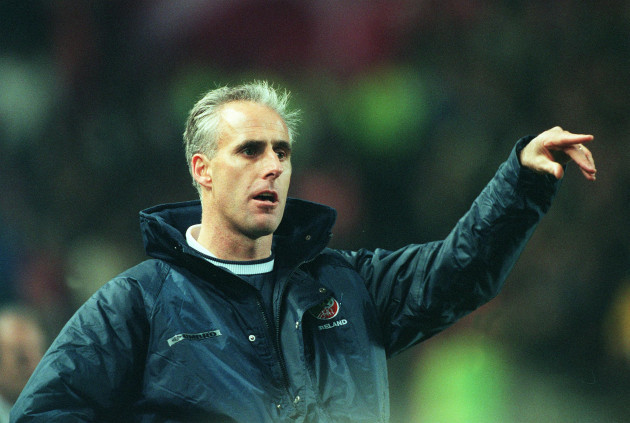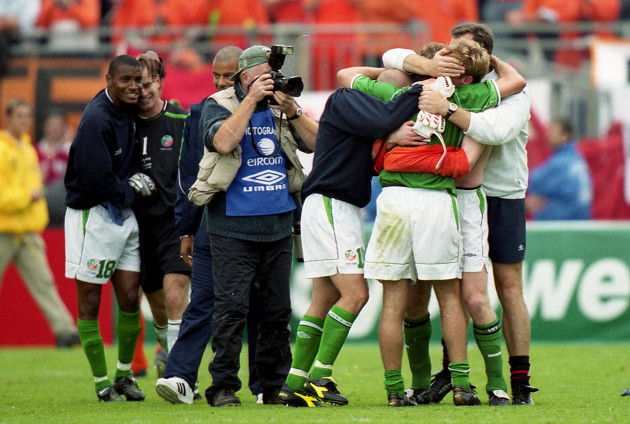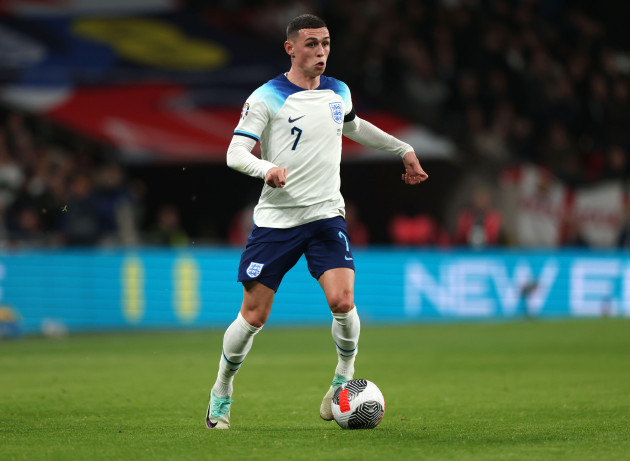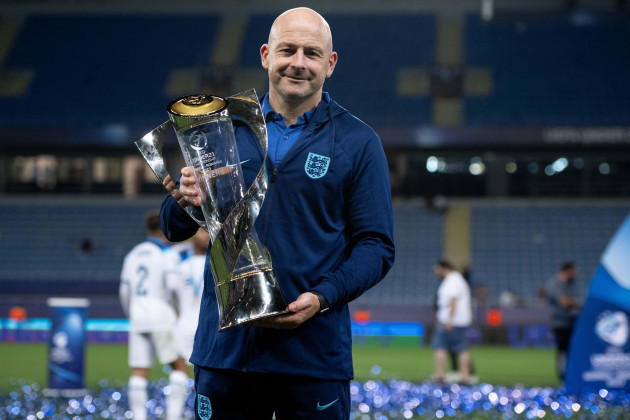IN AN industry not often characterised by brutal, on-the-record honesty, Lee Carsley has invariably come across as refreshingly plainspoken.
In March 1999, the midfielder joined a struggling Blackburn side for £3.4 million — a substantial fee at the time — though could not prevent their relegation.
Carsley went on to make over 50 appearances for Rovers but as soon as he lost his place in the team, the player made his intentions clear.
The Irish international made no secret to the media that his message to then-manager Graeme Souness was simple: ‘Play me or sell me’.
“I’m sure that one day if I’m a manager and I’m happy with my team, I won’t be changing it, so I’ve got no qualms,” he was quoted as saying by the Evening Press at the time.
“If the manager doesn’t rate me, fair enough, just let me move on.”
Carsley promptly joined Coventry City, though suffered another Premier League relegation in his first season there.
He was always more than good enough for the top flight, however, as he subsequently proved in seven campaigns with Everton — the highlight of which was probably the 2004-05 campaign, where he played 36 times as the Toffees finished fourth, still their highest-ever finish in the Premier League era.
His characteristic candour was evident in 2019 when he spoke to The 42 in depth about his Ireland career.
Carsley, a Birmingham native who qualified to represent the Republic through his Cork-born grandparents, gave a pretty unforgiving self-assessment of his time with Ireland.
“I’m not sure my style of football really suited international football,” he recalled. “There were a lot of technical fouls, a lot of time-wasting. We were quite passive in the way that we played. The opposition had a lot of the ball and when we had it, we were quite direct, so as a midfielder, you didn’t spend a lot of time on the ball — that took a bit of getting used to.”
A considerable number of his 40 caps were won under Mick McCarthy, yet he added: “I don’t think I played my best football for Ireland and I don’t think I played my best football under Mick.”
He featured in two unsuccessful playoffs early on his international career, as Ireland lost to Belgium ahead of the ’98 World Cup and tasted defeat in Turkey to deny them a place at Euro 2000.
He suggested that McCarthy “lost a bit of confidence in me” after a harsh penalty was awarded against him late on to deny Ireland a 1-0 win in the first leg against the Turks.
“I didn’t start the second leg, which was a bit of a kick in the teeth, to be honest. It was almost like: ‘Well, it was your fault that we [had a bad result].’ Obviously, it was because I gave away the penalty, but we missed a lot of chances, not that it was anyone else’s fault.”
Carsley invariably found himself well down the pecking order under McCarthy thereafter. At best, he was the fourth-choice central midfielder behind Roy Keane, Matt Holland and Mark Kinsella.
He was immensely proud to represent the Boys in Green but hated the long hours spent travelling, especially with the knowledge that he was unlikely to play.
Despite Roy Keane’s departure, Carsley was frustrated at having to make do with just one 88th-minute cameo appearance at the 2002 World Cup. He later admitted he would probably have followed Keane home after a week if given the chance.
“Obviously, Mick picked Matt Holland and Mark Kinsella. I thought I was playing better than both of them at the time, so I was a bit gutted that I didn’t start any of the games,” he said.
Carsley featured in the early stages of the Brian Kerr era but in April 2004, opted to take a break from internationals to focus on winning his place back in the Everton side.
He admits his commitment was not always as unwavering as it could have been.
“I played quite a lot of games early doors. Then, I found myself in and out of the team, which I didn’t deal well with at all. I was really frustrated with coming away for 10 days and not playing. So I found it quite difficult to hide my frustration.
“I like to think I behaved quite well [when out of the team]. The only slight negative was, that if I knew I wasn’t going to play and I had a slight injury at Derby, I wouldn’t go. Even though I got 40 caps, I probably could have got 50-60. If I didn’t think I was going to play and I had a slight injury, I wouldn’t go. I’d pull out, which obviously isn’t ideal. If I had a priority, it was playing for my club if I wasn’t going to be playing for Ireland.”
Family and missing his young children were also big factors in his decision to temporarily step away from international football.
“It’s constantly: ‘Where’s dad and when’s he coming back?’” he told Hot Press in 2007. “I wasn’t coming over with any enthusiasm, and no one should do that when they’re playing for their country.”
A return had looked unlikely following Steve Staunton’s appointment, with the Ireland legend keen to focus on younger, up-and-coming players, however, that all changed following the embarrassing 5-2 defeat in Cyprus, as it became sorely apparent that Carsley was still needed.
“Even then, if it wasn’t for the injuries, I don’t think Stan would have wanted me back in the squad,” he said. “I think he was under a bit of pressure, just because of the amount of players that were pulling out.
“As soon as the call was put in, I arrived the day before the game, I did one training session on the pitch, I started the game and I was back into it.
“In my second spell, I probably played my best football for Ireland.
“It’s probably because I knew I was rated by Stan. I felt confident in what I was doing at my club, I was playing well at Everton. Everton were doing really well — I was in a good team, so things just fell into place.”
Yet the second coming didn’t last long. Despite impressing in a friendly with Brazil under interim boss Don Givens after Staunton’s prompt departure, Carsley swiftly fell out of favour following Giovanni Trapattoni’s appointment.
“I remember us playing really well against Brazil. And if you had said to me after that game [it would be my last]… I’d had the full season with Everton. We’d done really well in Europe. I just remember Trapattoni had a training squad. I was like: ‘I need a rest, I’m not going.’ And I never got picked again after that. That was it.”
As a hard-working, tough-tackling midfielder, Carsley might come across to some as old school. However, it is an overly simplistic characterisation. As far back as his Derby County days, the midfielder was embracing modernity when a considerable portion of the football industry remained in the dark ages.
In a 1998 Sunday Independent interview, he spoke of the significant influence of sports psychology on his game.
“At the start of the season, I used to have a bit of a problem with my temper on the pitch,” he explained. “But since talking to [the psychologist] Bill, I’ve been able to control it.”
So far, his coaching career has included caretaker roles in charge of Coventry, Birmingham and Brentford, as well as underage stints with Birmingham, Brentford and Man City before beating off competition to become the new England U21 boss. He also had a forgettable three-month spell at Sheffield United in 2013 as an assistant boss alongside David Weir. After prevailing in their first match, the pair went on a 12-game winless run that resulted in their dismissal.
Ireland might also have formed part of his coaching CV had the powers that be at the time been more receptive towards finding a role for him.
“Me and Kevin [Kilbane] spoke to one of the FAI representatives a while back about getting involved with some of the age groups,” he told The 42 during the aforementioned interview. “This would have been six or seven years ago. Nothing was said after that. Ultimately, it wasn’t something I was going to chase. I’m easy to find. If they wanted us, they could have spoken to us. Now the fact that former players are getting involved is a massive positive.
“Developing homegrown coaches as well is really important. If you’re a coach from the Republic of Ireland who’s gone through all of your coaching badges and someone from outside comes in and takes one of the main jobs, I don’t think that’s fair. Ultimately, the best person has to be in the role. And if that person’s Irish, even better.”
Instead, Carsley’s formative coaching experiences came elsewhere.
“I absolutely loved it,” he said of his 18 months at Man City. “I went in there at a really good time. I went in there at the same time as Pep [Guardiola]. Watching him work and seeing how the best in the world does it is a real eye-opener. It was just something to aspire to, something to get near to.”
During his time with the Etihad outfit, he worked with several “outstanding” young players, including Phil Foden and Jadon Sancho.
“Really good lads as well, which is just as important. They’re the kind of lads you could spend some time with. They weren’t your stereotypical footballers, which is sometimes bandied about these Man City players, that they’re all about money and all the rest of it — these were far from that. They loved the game, had a great attitude, worked as hard if not harder than any players in the club and I was really lucky and grateful that I got given the chance to work with them.”
On what separated the few elite prodigies who made it from those that fell by the wayside, Carsley added: “It’s not just about on the pitch — there are lots of things that can hold players back. One of the traits of these top players is their tolerance and resilience levels. They’ve got total belief in what they’re doing, and their ability, and that was something that Man City had in a lot of areas with a lot of the players they had. They had a real belief in what they were doing and a real clear style of play and culture within the academy especially, which is set by the staff and the standards they expect.”
In addition, Carsley is always quick to point out the contribution of others to his success and is a big believer in the importance of delegation.
On his managerial ambitions, he explained: “A club with the right structure where you’re taken in there as a head coach, regardless of what level it is, is something I’ll look at doing in the future.
“Gone are the days now where the manager does all of the recruitment, does all of the hiring and firing, all of the off-the-field stuff.
“There are not a lot of managers that have got full autonomy of what goes on at the club. You’ll see a lot more head coaches, a lot more technical directors, and that’s like the sort of system I worked in at Brentford — it’s one that gives the manager or head coach a lot of support, which is what you need. If you’ve got all these different things to concentrate on, it’s very difficult to focus on what the team’s doing.”
While ex-pros often make the mistake of rushing into top-level management before they are ready, Carsley’s steps into this area have been deliberately tentative.
Earlier this year, he told The Sunday Times about a chastening experience while working as caretaker boss at Coventry and coming up against Kevin MacDonald’s Swindon Town.
“I was up against an experienced coach and he switched the system and changed something that I didn’t recognise until I watched back,” he recalled. “That is why I have so much respect for those who go from player to manager and have good careers because it is so difficult without a real foundation to work on. That’s when I almost took a step back and started looking more into tactics, more into player capabilities; more in terms of systems and where I can improve as a coach, almost as I did as a player. I was very methodical in my preparation and I have tried to take that into the way I prepare sessions and systems.”
Before becoming the U21 manager, Carsley was appointed as a full-time “out of possession” coach for all the England sides between U15 and U21 level — a position he held when The 42 last spoke to him.
“We’ve got a specialist coaching model where you’ve got a head coach, an in-possession coach, an out-of-possession coach,” he explained. “Basically, you’re role is to understand what your out-of-possession philosophies are in the game — where your strengths are going to be, what your weaknesses are, what the opposition is trying to do, and general trends that you’re seeing around the game that you can implement into the age groups. So it’s a really interesting role, it’s a great role. We’ve some really talented coaches and head coaches in the set-up. I’m learning stuff every day.”
Since becoming the manager proper, Carsley’s reputation has been enhanced, culminating in him guiding England to a spectacular triumph at the European U21 Championship for the first time in almost 40 years as they edged Spain during the final in Georgia.
Carsley had a talented squad to choose from with players including Liverpool’s Curtis Jones, Chelsea’s Cole Palmer and Arsenal’s Emile Smith Rowe.
However, the manager’s innovative approach earned him acclaim. Several players were picked in somewhat unfamiliar positions — Anthony Gordon was a striker, Angel Gomes started in central midfield and James Garner, predominantly a midfielder, played at right-back.
“We try not to be too restrictive on playing in certain positions,” Carsley told Talksport after the triumph. “It’s more the role and responsibility of the area of the pitch they’re in.
“As opposed to seeing them in positions, I thought have they got the profile and the attributes to play in those positions and they all have.
“All the players have a good understanding tactically of their role in their area within the pitch.”
One of the rare occasions Carsley has come across as coy is usually whenever he is asked about his future and specifically the Ireland job.
While admitting to keeping an eye on the national team’s results as a former player, previously, he has said that it would be “unfair” to speak about the Boys in Green job while Stephen Kenny was still employed by the FAI.
Carsley also played down the prospect of following in the footsteps of Gareth Southgate by transitioning from England U21 to senior manager.
“Gareth is a former England international who was heavily involved in all the pathway teams and then did great as a caretaker before taking over the senior team; I don’t see myself taking the same route.”
Some sceptics would likely agree with former Ireland international and Virgin Media pundit Keith Treacy’s suspicion that Carsley’s stock is simply “too high” now for him to take over the potentially poisoned chalice of a struggling international team like Ireland.
Yet Carsley, who is currently on a rolling one-year contract with the Three Lions, has continued to give little away. After winning the Euros, when asked again about links to both Ireland and Premier League clubs, he told Talksport: “I’ve never been one to make too many plans too far ahead. The big thing for me was doing well in the Euros. It’s great that we’ve won it but in the two-year campaign, I feel like we’ve had a lot of success in terms of players going in and out of the senior team.
“My priority has always been making sure I can do a good job today and not worrying about tomorrow.”






